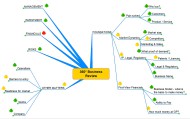FINANCIAL MANAGEMENT TIPS
Should we trade as a PLC
This is not a quick subject, and we can only scratch the surface here. Legal advice is advised - indeed whenever non-bank finance is required. If you have an existing business to convert into a
PLC, you'll also need to take advice on the tax position.
The company doesn't have to be quoted on a stock exchange to be a Public Limited Company (PLC). A PLC gives you several advantages:
(1) It looks more prestigious in attracting customers and staff
(2) It appears more secure for suppliers granting credit
(3) It lets you raise capital from the public (there are significant restrictions on how an ordinary private company can raise capital - do take legal advice!)
(4) It avoids issues if there are 50 or more shareholders. This can arise quite easily if other businesses have been acquired for shares
(5) It is in a form ready to float on a stock exchange if you plan to do so
But it also has several costly disadvantages, including:
(1) You must comply with various additional rules relating to PLCs, including when you can start trading
(2) You usually need to use a formal prospectus to raise capital
(3) As a small company you will need an audit when you would otherwise not need one
(4) You need at least £50000 in share capital. However, only £12500 (25%) is needed to get a PLC started, as long as you realise that the remaining £37500 can be called up by the company if it needs
it.
A PLC is therefore not a route to be taken lightly. If you want to consider your position further, Camwells can help.
Camwells celebrates three decades at the forefront of business
So you’ve got a great business idea? Validate, challenge and strengthen it with the Camwells 360° Business Review Free initial discussion:
'Camwell Consulting'
was founded in 1993.



